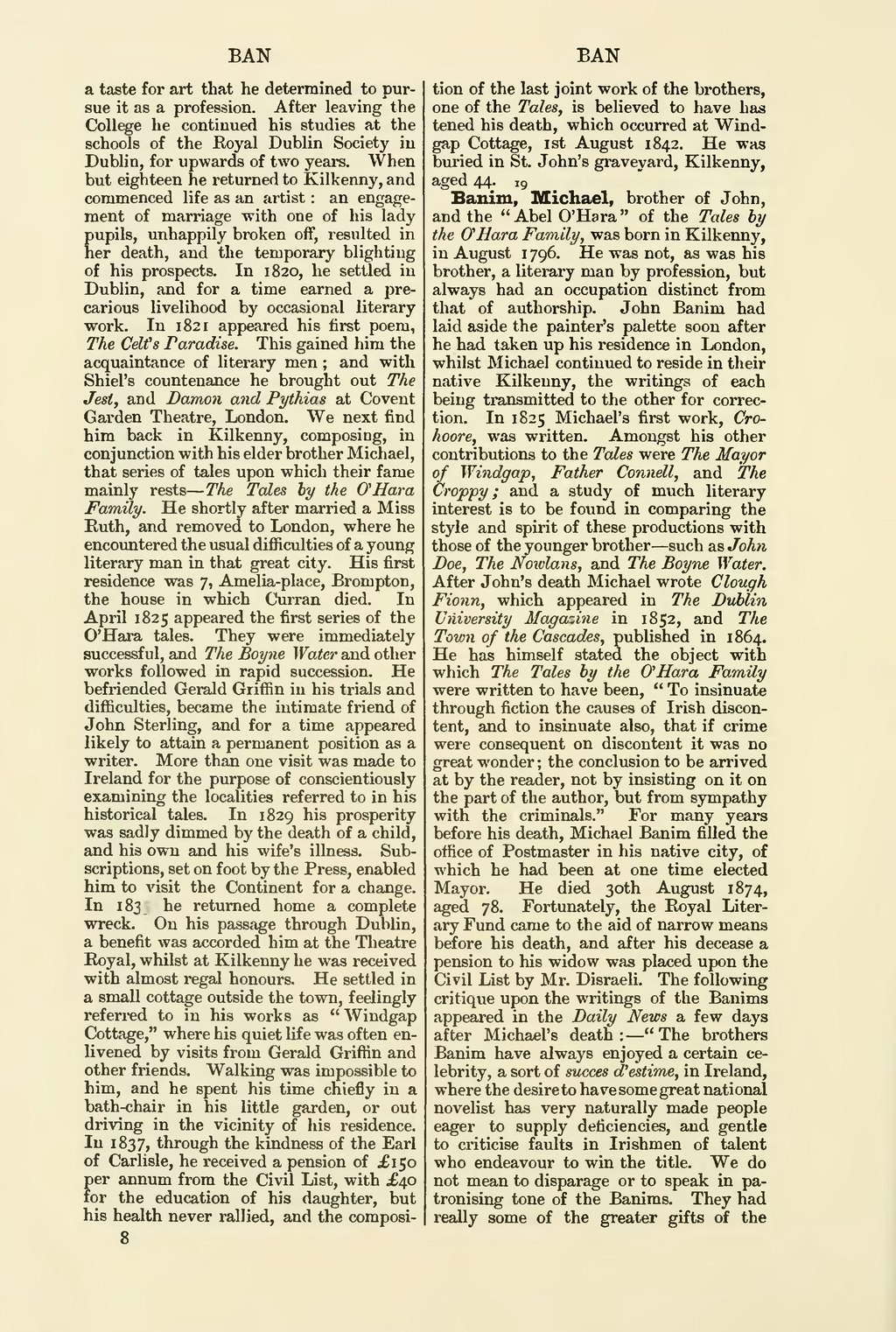a taste for art that he determined to pursue it as a profession. After leaving the College he continued his studies at the schools of the Royal Dublin Society in Dublin, for upwards of two years. When but eighteen he returned to Kilkenny, and commenced life as an artist: an engagement of marriage with one of his lady pupils, unhappily broken off, resulted in her death, and the temporary blighting of his prospects. In 1820, he settled in Dublin, and for a time earned a precarious livelihood by occasional literary work. In 1821 appeared his first poem, The Celt's Paradise. This gained him the acquaintance of literary men; and with Shiel's countenance he brought out The Jest, and Damon and Pythias at Covent Garden Theatre, London. We next find him back in Kilkenny, composing, in conjunction with his elder brother Michael, that series of tales upon which their fame mainly rests—The Tales by the O'Hara Family. He shortly after married a Miss Ruth, and removed to London, where he encountered the usual difficulties of a young literary man in that great city. His first residence was 7, Amelia-place, Brompton, the house in which Curran died. In April 1825 appeared the first series of the O'Hara tales. They were immediately successful, and The Boyne Water and other works followed in rapid succession. He befriended Gerald Griffin in his trials and difficulties, became the intimate friend of John Sterling, and for a time appeared likely to attain a permanent position as a writer. More than one visit was made to Ireland for the purpose of conscientiously examining the localities referred to in his historical tales. In 1829 his prosperity was sadly dimmed by the death of a child, and his own and his wife's illness. Subscriptions, set on foot by the Press, enabled him to visit the Continent for a change. In 1835 he returned home a complete wreck. On his passage through Dublin, a benefit was accorded him at the Theatre Royal, whilst at Kilkenny he was received with almost regal honours. He settled in a small cottage outside the town, feelingly referred to in his works as "Windgap Cottage," where his quiet life was often enlivened by visits from Gerald Griffin and other friends. Walking was impossible to him, and he spent his time chiefly in a bath-chair in his little garden, or out driving in the vicinity of his residence. In 1837, through the kindness of the Earl of Carlisle, he received a pension of £150 per annum from the Civil List, with £40 for the education of his daughter, but his health never rallied, and the composition of the last joint work of the brothers, one of the Tales, is believed to have hastened his death, which occurred at Windgap Cottage, 1st August 1842. He was buried in St. John's graveyard, Kilkenny, aged 44. 19
Banim, Michael, brother of John, and the "Abel O'Hara" of the Tales by the O'Hara Family, was born in Kilkenny, in August 1796. He was not, as was his brother, a literary man by profession, but always had an occupation distinct from that of authorship. John Banim had laid aside the painter's palette soon after he had taken up his residence in London, whilst Michael continued to reside in their native Kilkenny, the writings of each being transmitted to the other for correction. In 1825 Michael's first work, Crohoore, was written. Amongst his other contributions to the Tales were The Mayor of Windgap, Father Connell, and The Croppy; and a study of much literary interest is to be found in comparing the style and spirit of these productions with those of the younger brother—such as John Doe, The Nowlans, and The Boyne Water. After John's death Michael wrote Clough Fionn, which appeared in The Dublin University Magazine in 1852, and The Town of the Cascades, published in 1864. He has himself stated the object with which The Tales by the O'Hara Family were written to have been, "To insinuate through fiction the causes of Irish discontent, and to insinuate also, that if crime were consequent on discontent it was no great wonder; the conclusion to be arrived at by the reader, not by insisting on it on the part of the author, but from sympathy with the criminals." For many years before his death, Michael Banim filled the office of Postmaster in his native city, of which he had been at one time elected Mayor. He died 30th August 1874, aged 78. Fortunately, the Royal Literary Fund came to the aid of narrow means before his death, and after his decease a pension to his widow was placed upon the Civil List by Mr. Disraeli. The following critique upon the writings of the Banims appeared in the Daily News a few days after Michael's death:—"The brothers Banim have always enjoyed a certain celebrity, a sort of succes d'estime, in Ireland, where the desire to have some great national novelist has very naturally made people eager to supply deficiencies, and gentle to criticise faults in Irishmen of talent who endeavour to win the title. We do not mean to disparage or to speak in patronising tone of the Banims. They had really some of the greater gifts of the 8

